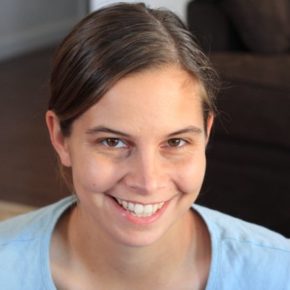Contributors

Brittany Ackerman is a writer from Riverdale, New York. She earned her BA in English from Indiana University and graduated from Florida Atlantic University’s MFA program in Creative Writing. She teaches Critical Studies at AMDA College and Conservatory of the Performing Arts in Hollywood, CA. She was the 2017 Nonfiction Award Winner for Red Hen Press, as well as the AWP Intro Journals Project Award Nominee in 2015. Her work has been featured in The Los Angeles Review, No Tokens, Hobart, Cosmonauts Ave, Fiction Southeast, and more. She currently lives in Los Angeles, California. Her collection of essays, The Perpetual Motion Machine, was released by Red Hen Press in November of 2018.

Photo by Donna Neal
Steve Adams’s creative nonfiction was included in the 2014 Pushcart Prize XXXVIII anthology and the Pushcart Press’s special 2018 anthology, Love Stories for Turbulent Times, listed as a “Notable Essay” in the 2016 Best American Essays, and published in The Millions, Willow Springs, The Pinch, Grist, Notre Dame Magazine, and elsewhere. His fiction has been nominated for Pushcart Prizes, anthologized in Sudden Fiction (Continued) and published in Glimmer Train, The Missouri Review, Chicago Review, and elsewhere. He’s won Glimmer Train’s Short Story Award for New Writers, been a guest artist at The University of Texas, a scholar at the Norman Mailer Writers’ Colony and Cuttyhunk Island Writers’ Residency, a resident artist at Jentel, and his plays have been produced in New York City. He is a writing coach and freelance editor at www.steveadamswriting.com.
Caitlin Church is a pseudonym. The author states that this is a work of nonfiction but also a literary dialogue, and the voices of Ted Hughes and Angela Carter echo here. The author states, “After the unraveling of my marriage, I found solace in the prose of Angela Carter, the poetry of Ted Hughes, and the ideas of Joseph Campbell. It was Carter’s seminal work on the awakening of female sexuality, ‘The Company of Wolves,’ and Hughes’ anguished victim-hood poem, ‘The Howling of Wolves,’ that triggered my interest. They reminded me of Campbell’s suggestion that, because human experience is often ‘beyond words,’ we create mythology and fairytales to pitch ‘the mind beyond that rim, to what can be known but not told.’ Reading when I could not sleep, it seemed to me that a kind of literary discourse was taking place. Woven with belletristic reminiscences (words, phrases, notions), ‘The Earth Creaks’ is the culmination of those late night, wine-fueled conversations.”

Laura Michele Diener teaches medieval history and women’s studies at Marshall University in Huntington, West Virginia. She received her doctorate in history from The Ohio State University and has studied at Vassar College, Newnham College, Cambridge, and most recently, Vermont College of Fine Arts, where she received her MFA in 2016. Her academic work focuses on female spiritualty, medieval textiles, and fashion. Her creative work and journalism has appeared in publications such as Under the Gum Tree, Dappled Things, Numero Cinq, Yes! Magazine, The Catholic Worker, Lake Effect, Appalachian Heritage, and Cargo Literary Magazine. She is currently at work on a biography of the Norwegian novelist Sigrid Undset.

Patricia Foster is the author of All the Lost Girls (PEN/Jerard Award), Just beneath My Skin (3 Notable essays), and Girl from Soldier Creek (SFA Fiction Award) as well as essays in VQR, Antioch Review, Southern Review, and others. She has been a professor in the MFA Program in Nonfiction at the University of Iowa for over 20 years. She is currently working on a book of essays, What Needs to Be Needed: Portraits and Provocations, of which “Written in the Sky” is one.

J. Malcolm Garcia is the author of The Khaarijee: A Chronicle of Friendship and War in Kabul; What Wars Leave Behind: The Faceless and Forgotten; and Without A Country: The Untold Story of America’s Deported Veterans. His most recent book is Riding Through Katrina With The Red Baron’s Ghost (Skyhorse 2018). In 2019, Garcia’s book, Fruit of All My Grief: Lives in the Shadows of the American Dream, will be published by Seven Stories Press. Garcia is a recipient of the Studs Terkel Prize for writing about the working classes and the Sigma Delta Chi Award for excellence in journalism. His work has been anthologized in The Best American Travel Writing, The Best American Nonrequired Reading, and The Best American Essays.

Andrew Gudgel is a freelance writer and Classical Chinese translator. His poetry and translations have appeared in Southeast Missouri State University’s “Proud to Be” anthology, Asimov’s Science Fiction Magazine, and Western Michigan University’s journal Transference. His nonfiction has appeared in publications as diverse as Asia-Pacific Defense Forum and Internet Genealogy. He has a MA in Science Writing from Johns Hopkins University and was recently accepted to the 2019 Kenyon Review Literary Nonfiction Writers Workshop. “The Shape of the Skull, the Shape of the Mind” is his first published science essay.

Paul Hostovsky is the author of ten books of poetry, most recently, Late for the Gratitude Meeting (Kelsay Books, 2019). He has won a Pushcart Prize, two Best of the Net awards, the FutureCycle Poetry Book Prize, and has been featured on Poetry Daily, Verse Daily, and The Writer’s Almanac. He makes his living in Boston as a sign language interpreter and Braille instructor. Website: paulhostovsky.com

Rick Kempa, poet and essayist, lives in Rock Springs, Wyoming. Recently retired after thirty years of teaching at Western Wyoming College, he has embarked on a path of full-time writing and walking. Rick has edited two books about the Grand Canyon, ON FOOT: Grand Canyon Backpacking Stories, (Vishnu Temple Press, 2014) and Going Down Grand: Poems from the Canyon (Lithic Press, 2015). His latest poetry collection is Ten Thousand Voices. Other essays of his can be read online at Hippocampus, Blue Lyra Review, Ducts.org and Watershed Review. For more info, see www.rickkempa.com.

Joe Kraus teaches creative writing and American literature at the University of Scranton, where he is currently department chair. He is the author of the forthcoming The Kosher Capones (Northern Illinois UP, 2019) and co-author of An Accidental Anarchist, (Chicago Review Press, 2004) which served as a basis for Aleksandar Hemon’s National Book Award finalist The Lazarus Project. His creative work has been published, among other places, in The American Scholar, Baltimore Review, Riverteeth, and Juked. He won a 2004 Dorothy Sargent Rosenberg Memorial poetry prize, the 2008 Moment Magazine/Karma Foundation Prize for short fiction, and was nominated for a Pushcart Prize in 2010 by Southern Humanities Review.

Mel Livatino’s essays have appeared numerous times in Under the Sun, The Sewanee Review, Notre Dame Magazine, Portland Magazine, Writing on the Edge, River Teeth, and elsewhere. In the last 15 years ten of his essays, including six from UtS, have been named Notable Essays of the Year by Robert Atwan’s Best American Essays annual. He lives in Evanston, IL, and is retired from teaching English for 36 years in the City Colleges of Chicago. He has finished a collection of essays entitled Wintry Rooms of Love and is currently looking for a publisher. He is also at work revising a book about his wife’s 11-year descent into Alzheimer’s, her death, and the grief of losing her twice, tentatively titled Long Cry of Goodbye: Days and Nights of Alzheimer’s, Death, and Grief.

West Virginia native Marie Manilla is a graduate of the Iowa Writers’ Workshop. Her novel, The Patron Saint of Ugly, received the Weatherford Award. Shrapnel won the Fred Bonnie Award for Best First Novel. Stories in her collection, Still Life with Plums, first appeared in the Chicago Tribune, Prairie Schooner, Mississippi Review, and other journals. Her essays have appeared in Word Riot, Cossack Review, Hippocampus, Still, and elsewhere. Learn more at www.mariemanilla.com.

German-born and American bred, Maddie Lock fell in love with words as she learned the English language. Lock has published an award-winning children’s book, lamented several times about her writing obsession in Brevity, and published essays in Gravel, Wanderlust-Journal, and The RavensPerch. She is currently working on a memoir about her scattered roots, using research as a great excuse to travel frequently.

Elaine Fowler Palencia is the author of six books of fiction, three poetry chapbooks, and a short monograph, The Literary History of Hindman Settlement School. Her book on her great-great grandfather’s Civil War experiences, On Rising Ground: the Life and Letters of John M. Douthit, 52nd Georgia Infantry, CSA, will be published in 2020 by Mercer University Press. She is the moderator of the Red Herring Fiction Workshop of Champaign-Urbana IL and a founding member of the Quintessential Poets of C-U.

Arthur Plotnik is the author of nine books, including Spunk & Bite: A Writer’s Guide to Bold, Contemporary Style and two Book-of-the-Month Club selections, plus award-winning fiction, essays, poetry, op-eds, and biography. His latest book is the YA novel, Aaron Schmink’s First Crazy Love. He studied under Philip Roth at the Iowa Writers Workshop and was editorial director for the American Library Association. A former columnist for The Writer magazine, he lives in Chicago.

Dave Sanfacon holds an MFA degree in Creative Writing from Lesley University. In another lifetime he earned a B.S. in Economics from Clark University in Worcester, MA. He has published or has work forthcoming in Fiction Southeast and The Good Men Project, as well as Under The Sun. His primary gig for the past seven years has been as a stay at home dad to twin seven year olds. Dave enjoys running along the Charles River, climbing the stairs at Harvard Stadium, and expounding on the epic brilliance of the Grateful Dead’s Europe ’72 tour. Dave lives in Cambridge, MA
with his wife, Laura, and their twins.

Richard Schmidt (photography and art) attended Ball State University, served in the Air Force, and worked for the University of Southern Indiana from 1972-2002. He retired as Vice President of Business Affairs and Treasurer Emeritus. He lives in Hendersonville, North Carolina, where he enjoys gardening, golf, classical guitar, and photography.

Photo by Bernard Van Leer
Rick Smith is a poet, former editor, blues harmonica player, and clinical psychologist living and working in southern California. His latest book of poetry is Whispering in a Mad Dog’s Ear by LUMMOX Press (2014). He is also the author of Hard Landing (LUMMOX Press, 2011), The Wren Notebook (LUMMOX Press, 2000) and Exhibition Game (G. Sack Press, 1973). His blues harmonica playing may be heard in recordings of The City Lights, which he founded, in many other bands and recordings, and on the soundtrack of three films, including this clip from the film Days of Heaven. He can be found online at docricksmith.com.

Paul Swehla is a chef with degrees in education, theology, and Judaic studies. His spiritual and philosophical writings center on comparative religion, mythology, mysticism, and depth psychology. He’s the author of Gilgul: Transmigration (Tikkun Pulishing, 2016) and The Dystopian Hermit Monk (Tikkun Publishing, 2018). The latter was adapted for the stage and garnered an award from PEN America. Paul’s work has appeared in Prisology, The Santa Fe Literary Review, The Safe Streets Arts Foundation, Under the Sun, ArLiJo, and other journals. Paul is currently looking for a small literary press to publish his third book, a collection of essays entitled The Evolution of Belief: Essays from Underground, from which this piece is taken.
Paul is nearing the end of a 22-year federal prison sentence related to the accidental overdose and death of his friend, Ryan. Upon release, he’ll reconvene work as a chef, publish a literary journal, and serve as the editor-in-chief of Tikkun Publishing. Find out more at www.tikkunpublishing.com. Write him at paul@tikkunpublishing.com

Gina Troisi received an MFA in Creative Nonfiction from The University of Maine’s Stonecoast MFA Program in 2009. She recently received an Honorable Mention for American Literary Review’s Contest in Nonfiction, 2018. Her work has appeared in numerous literary journals and anthologies, including Fourth Genre, The Gettysburg Review, Fugue, Flyway: Journal of Writing and Environment, and elsewhere. At the present, she is seeking a home for her memoir, The Angle of Flickering Light, which was a finalist for the 2018 Autumn House Press Full-Length Contest, a semi-finalist for Zone 3 Press Creative Nonfiction Book Award, 2015, a finalist for the 2013 William Faulkner-William Wisdom Narrative Nonfiction Prize and the 2012 Autumn House Nonfiction Prize, and was awarded Second Place in Memoir for Southwest Writers Competition in 2012.

Jay Wamsted has taught math at Benjamin E. Mays High School in southwest Atlanta for fourteen years. In addition to an essay forthcoming in Harvard Educational Review, his work has been featured in various journals and magazines, including Mathematics Teacher, Qualitative Inquiry, and Sojourners. “Walls,” his 2017 essay published in Little Patuxent Review, was named a Notable Essay for this year’s Best American Essays. He can be found online at The Southeast Review, Under the Sun, and the TEDx YouTube channel, where you can watch his 2017 talk “Eating the Elephant: Ending Racism & the Magic of Trust.” He and his wife have four young children, and he rides his bicycle to and from work just about every day.

Christina U. Schmidt is a photographer based in Atlanta, Georgia. She specializes in travel, landscape, and sports photography. Her sports photos have appeared numerous times in the USA Ultimate Magazine as well as on various online media websites. You can see more of her work at SmugMug, and you can visit her on Facebook.






















Recent Comments